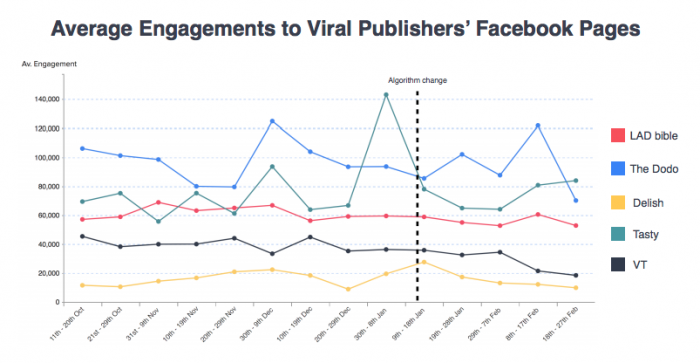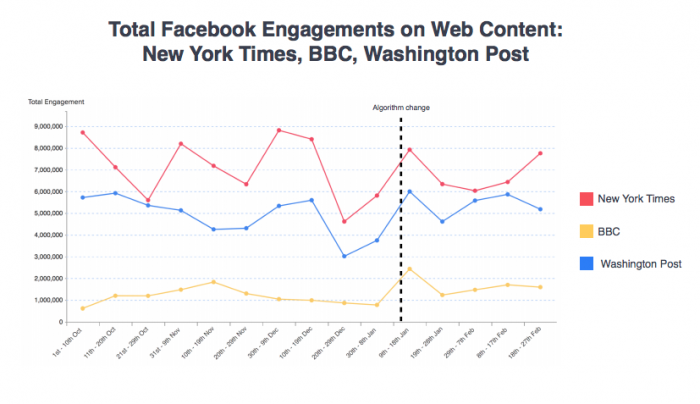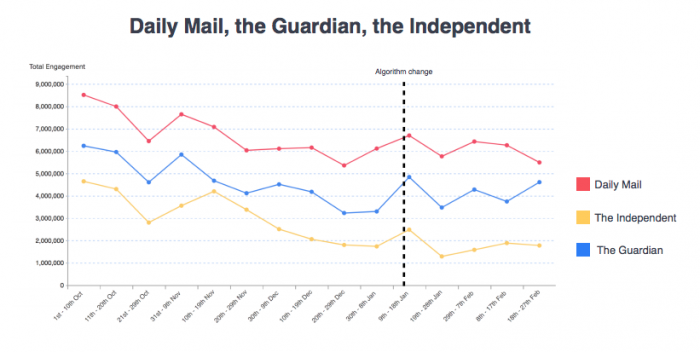It’s been two months since Facebook dropped the bomb for many publishers about changing its algorithm, demoting news from about five percent of one’s News Feed to four percent in favor of “meaningful interactions.”
NewsWhip, the social media monitoring company, crunched some numbers on how publishers’ Facebook pages have been faring since then and offered some tips for not being the next Little Things, Cooking Panda, or Opposing Views. The full report can be found here.Over half of the stories with top engagement in the past two months include hard news/current events/breaking news: “Surprisingly, the top stories since the algorithm change have had a good deal of breaking news at the top of the chart. In fact, since the Facebook algorithm change, 56 of the top 100 most engaging articles as of March 15th have been hard news/current event stories.” NewsWhip also noted that 53 of the top 100 stories were from general news publishers.
Compelling global events with a “very human element” still draw sizable engagement, such as the deaths of Stephen Hawking, Dolores O’Riordan, and Billy Graham. NewsWhip says Hawking’s passing was the most viral story in this period and also pointed to seismic events like the solar eclipse as an opportunity to connect readers. (The next solar eclipse, though, is in 2024.)
Misinformation isn’t gone: A fake story about how the “‘disastrous’ flu shot is causing a deadly flu outbreak” was the 26th most engaging story since the algorithm change, with almost 850,000 engagements on Facebook.
Niche, viral publishers are still figuring things out, though Little Things was the first one to go. Some organizations are using e-commerce as a buffer: NewsWhip says PopSugar will start hawking beauty products and High Snobiety has a goal to make e-commerce 30 percent of its revenue.

Comments are increasing: “In January 2016, comments only accounted for 3.36 percent of a top Facebook post’s engagements, on average. There was a ‘Trump bump’ in January 2017 that mellowed out. But since the algorithm change, this number has skyrocketed to 11 percent.”

Videos are still harnessing a higher proportion of interactions — 92 of the top posts from publishers and brand Pages after the algorithm change were still native videos, with one Facebook Live. However, “Tag your friend who ___ here” prompts may not necessarily be factored into Facebook’s consideration of a “meaningful interaction,” NewsWhip says. For non-video, more controversial or political link posts have greater chances at attracting comments. ¯\_(ツ)_/¯
NBC News has bested Fox News as the most engaged publisher on Facebook for the first time since January 2017, signaling that “the major sites with network abilities and scale in breaking news events are likely to continue to perform well on social media,” NewsWhip says. Reporters from hyperpartisan sources are still outpacing non-hyperpartisan reporters.
The report includes graphs about some news organizations’ traction before and after Facebook announced the algorithm change (remember that the change took place before the announcement was made):





Leave a comment